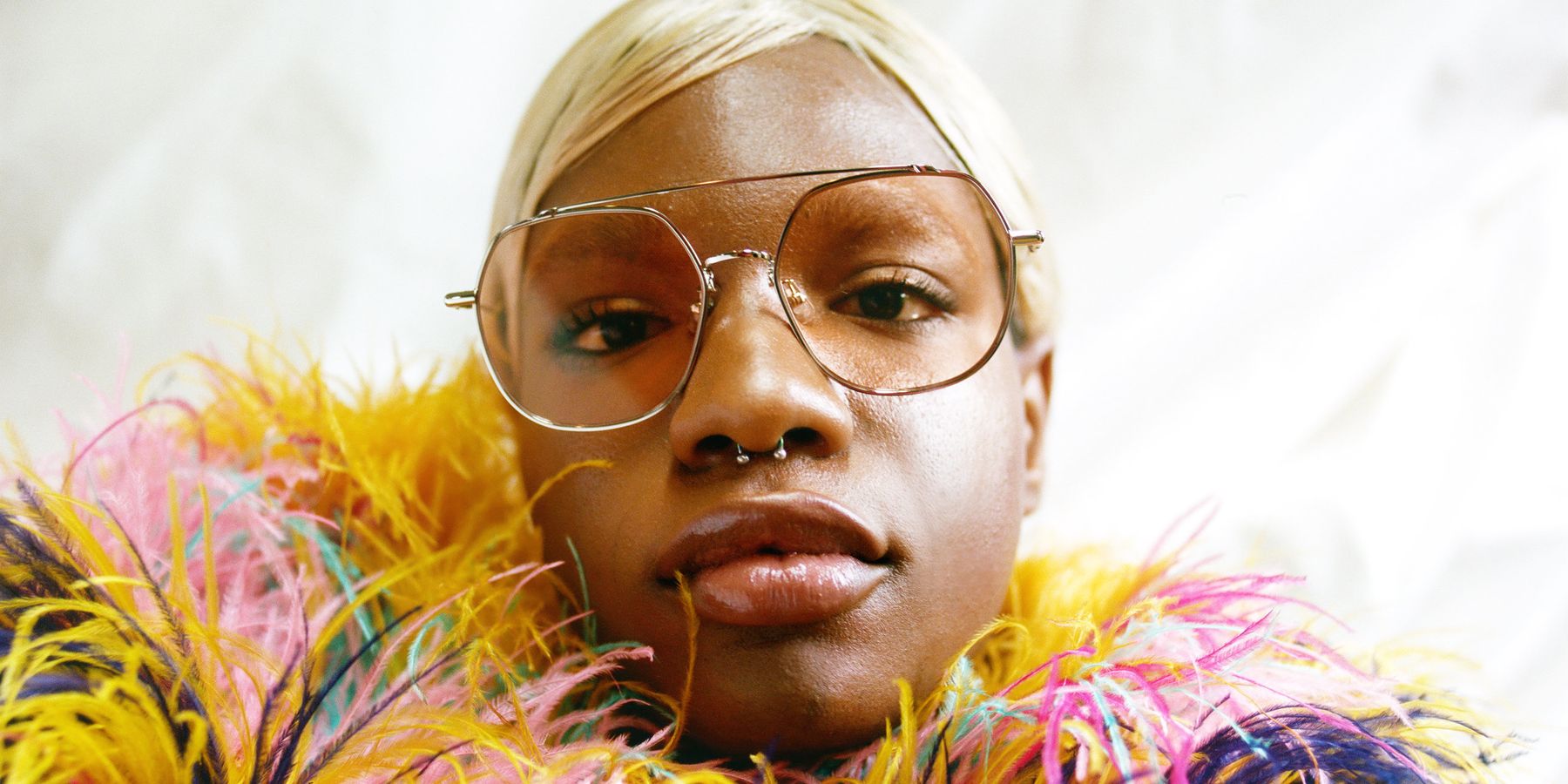
Naomi Campbell Interviews Trailblazing Model Aaron Philip
Story by Justin Moran / Photography by Myles LoftinJun 24, 2019

When Aaron Philip made her runway debut this month at Willie Norris' fashion show, screams from the crowd vibrated the walls and finger snaps filled the air. She wore a bold red lip, platinum blonde bob and a t-shirt hung across the back of her wheelchair with the words "Queer Capital."
The moment was life-changing for Philip, who wrote on Instagram after, "My hands were shaking and my heart was beating out of my chest." As a Black, transgender, wheelchair-using teenager, the 18-year-old's appearance was an opportunity she willed into existence within a few short years — and it's only the beginning. "I hope that my first show goes to show that runways and fashion collections with people like me in it can be possible," Philip wrote, "and there should be more things and opportunities like this everywhere within the fashion industry/world."
In November 2017, Philip posted photos of herself on Twitter that expressed her dreams of becoming a professional model with cerebral palsy. "When I get scouted/discovered by a modeling agency, it's over for y'all," she warned, demanding greater representation in the fashion industry to reflect her own life experiences. To date, Philip's tweet has nearly 24k retweets and 100k likes — the first viral push that helped kickstart her freelance modeling career. With support from her family, who are originally from Antigua and immigrated to the U.S. when Philip was three, she started posing for fashion editorials and campaigns, all while building her online profile (She has more than 100k combined followers.)
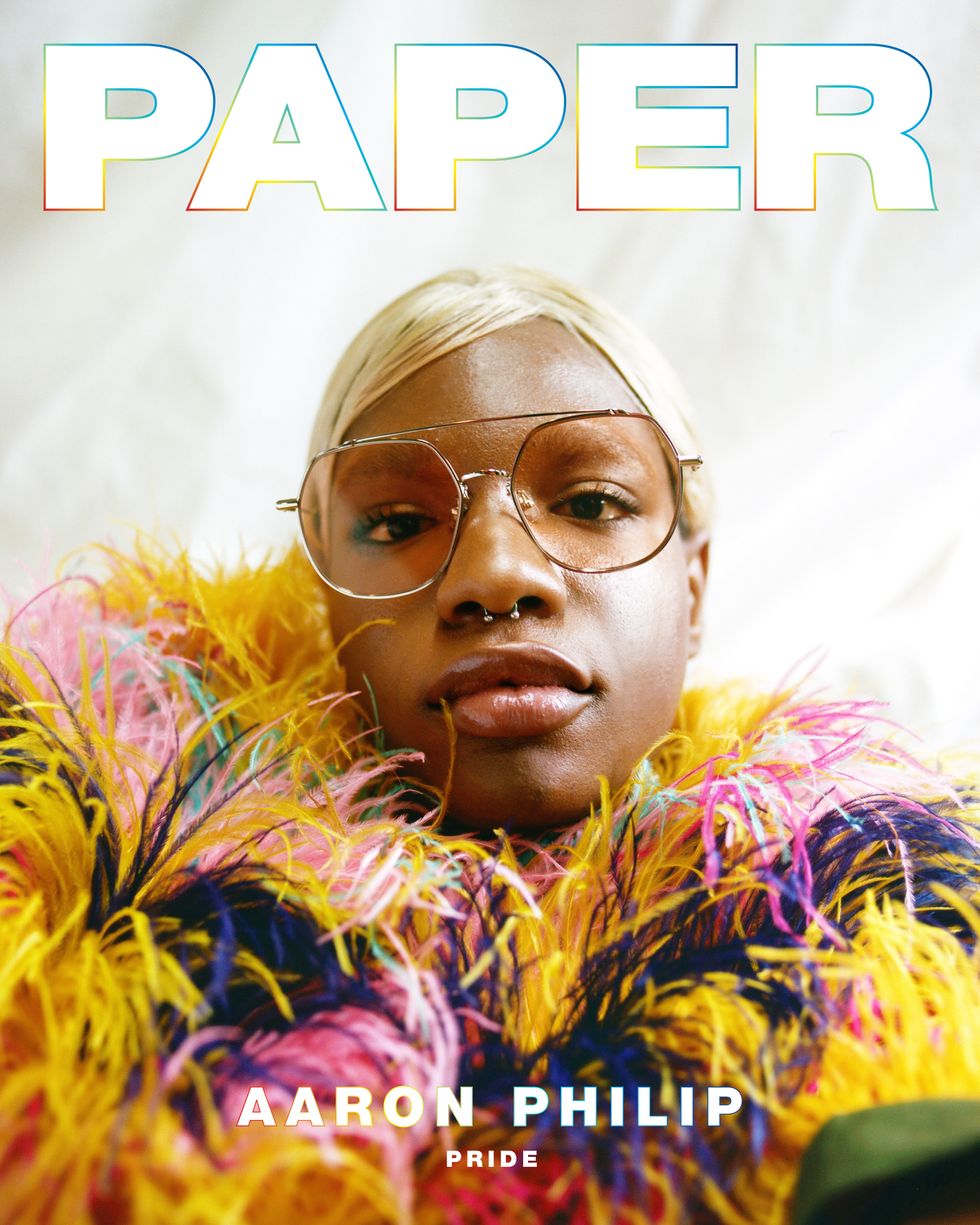
Jacket: Prabal Gurung, Sunglasses: Gentle Monster
Elite Model Management eventually contracted her in September 2018, making Philip the first Black, trans disabled model to sign for a major agency. With backing from a fashion gatekeeper that's previously worked with icons like Naomi Campbell and Tyra Banks, Philip has become a model of the moment, and landed her first major campaign this summer with Sephora. Her image, photographed by Luke Gilford, is plastered across New York City; there's something truly remarkable about seeing Philip blown up to the size of a city bus, looking down on passersby — completely self-made and self-assured.
Campbell, whom Philip says is one of her greatest modeling influences, shared a similar experience of pushing forward in the face of systematic resistance. At the beginning of Campbell's career, she was subject to blatant racism and discrimination in an industry that prioritized her white peers. Designers wouldn't cast Campbell because she was Black, while makeup artists and hair stylists weren't trained to work with her skin tone or hair. Even magazines upheld discriminatory practices in the '80s; after Yves St. Laurent threatened to cut advertising from French Vogue for their refusal to put Black models on covers, Campbell became the first POC cover star in August 1988. "I understood what it meant to be Black," Campbell wrote in The Guardian. "You had to put in the extra effort. You had to be twice as good."
Philip sees the connections between her work today and Campbell's. "We're both Black women getting a platform and doing lots of work that should be done," she says. "And we're being visible in the ways that leave an impact and a lasting impression. We're garnering success and we will continue to, and with that comes a lot of criticism and hatred. So we have to keep our skin on, we have to keep professional even though we shouldn't have to because we deserve to express our emotions when we go through these things. It's just a matter of stepping your foot down and being brave, but also knowing that we are what we are, as we are."
Below, for PAPER Pride, we asked Naomi Campbell and Aaron Philip to interview each other about forging a new lane in fashion, and why, despite the groundbreaking moves she's already made, Philip is just a normal teenage girl from the Bronx with huge ambitions.
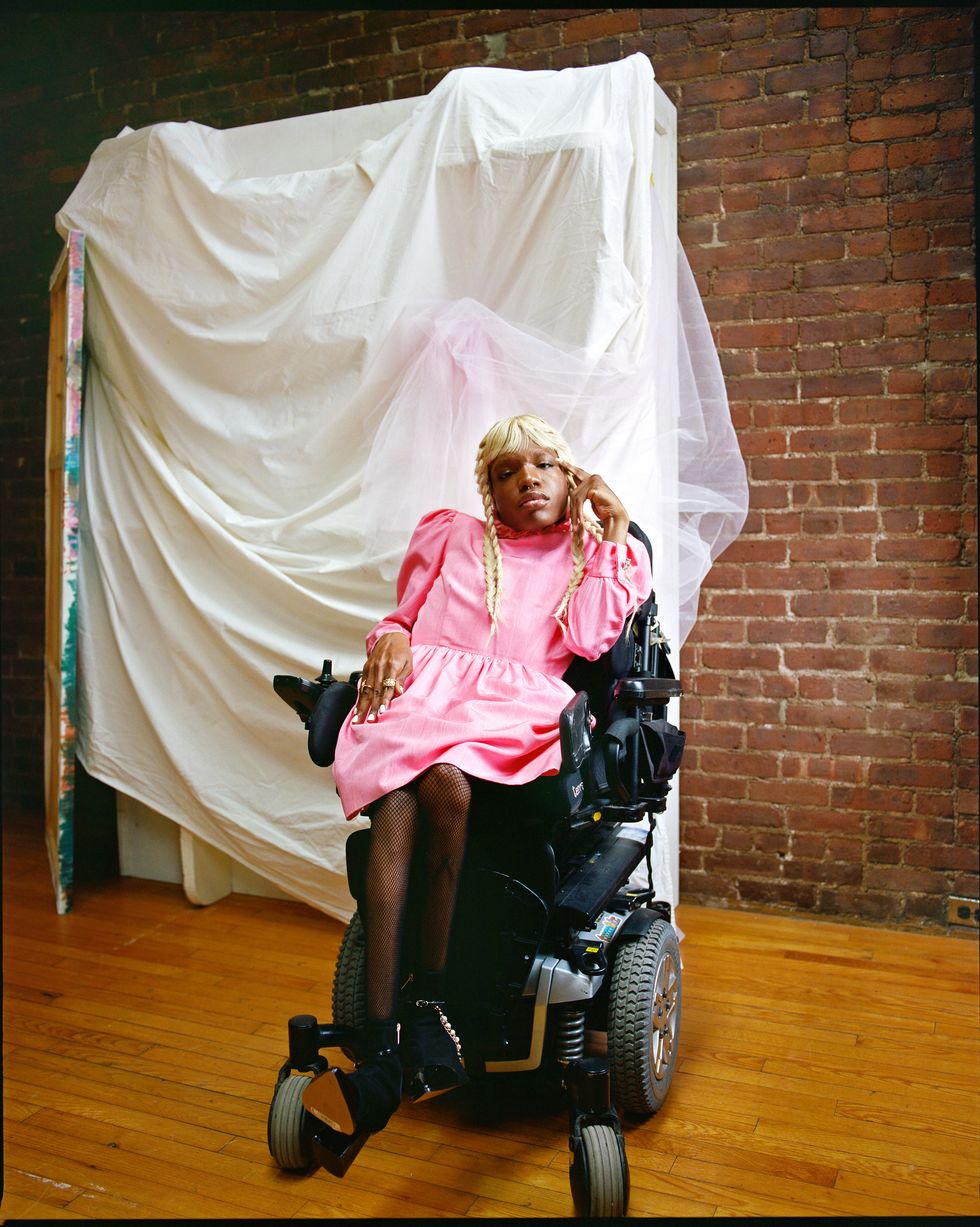
Dress: THE Marc Jacobs, Rings: L'Enchanteur, Shoes: Adeam

Naomi Campbell: What interested you about the fashion industry growing up, and did you have a sense that you would be part of it someday? If so, when did that moment happen?
Aaron Philip: I grew up and always looked at fashion as something that I loved, because more than anything, I was born and raised on the internet. And when you're on the internet and exposed to things like advertisements, you see fashion advertising. So I always saw Marc Jacobs, Prada and Dior, right below my keyboard, and I was like, Oh my gosh, I love this. It was only until I was about 12 or 13, when I started looking into it seriously. I got ahold of Vogue, Dazed, and i-D, and I fell in love with the industry and with seeing people wear beautiful clothes in a way that's so visible and public as models.
I was always very aware of my identity as a person in a wheelchair. And I later became more aware of my transness eventually, but more than anything, I was hyper-aware of my disability. I realized there's no one I see on TV or online or in fashion, on the stage that I love, looking like me. And I knew that was a problem, because I knew inherently, there was nothing wrong with me. I know what people thought of disability and ableism, so I decided for it to become my journey when I was about 16, to actually become a model.
I didn't know what that meant to me until I did research, but I knew more than anything that I wanted to start out with head shots, and I wanted to manifest these dreams. But they weren't acceptable to me if I were to go to a modeling industry and present myself because they're not exactly looking for me when they cast people or bring new faces in. So I decided to make it into a public journey where I figured, maybe if this gets enough attention and maybe if people see what I see for myself and what I see for people like me, maybe people will catch on.
Naomi Campbell: Who was a role model to you and in what ways did they influence you?
Aaron Philip: My mom, Lydia Philip, she lives in Antigua, she's definitely one of my role models. It's because my mom is really fearless and she's very bold. She loves taking risks, she loves creating things. She loves creativity and she has this thing in her mind and heart where there's no space for bigotry, and there's no space for negativity when it comes to people who are different. She always knew that, and she raised me with a lot of thought. She put a lot of thought into making me a thinker. She really wanted me to think critically and to have my head on about the world and the way I see it and to keep my morals set. So she's this really strong individual who's really set in her ground. She's really inspiring, especially as a woman. She always says, as a woman, nothing limits her. Everything is possible no matter what it is.
Naomi Campbell: Who are your favorite designers and who would you like to work with?
Aaron Philip: I love Miuccia Prada. I love Donatella Versace... Helmut Lang, Versace, Gucci. I'm really into the houses that are famous for making beautiful clothes and beautiful designs. The first thing that comes to mind is Prada and Miu Miu being that they're so representative of alternative femininity — either making or breaking the standard of what femininity is through their lens. They have a really contemporary image of what femininity is to them and what fashion for women and femmes are, and I feel like that's so cool to see because it's so centered around women. Also, Marc Jacobs, for sure. I love Marc Jacobs. Marc Jacobs is actually one of my number one shows.
Naomi Campbell: How has the internet helped transform your career?"
Aaron Philip: I wouldn't have a start if it wasn't for the internet. And I mean that really literally where, I went on Twitter when I was 16 and made this Tweet. I had these headshots I just took at the park, it was a November afternoon, I finally got them from my [photographer] friend, and I just said, "It's time. I'm ready." So I made my tweet and did this call to action where I said, "Honestly, when I'm scouted and discovered, it's gonna end for the industry because they've never seen anything like it before, and I think it's time to start this revolution." I don't even want to think of it as a revolution, but it kind of is within itself being that. Within the career that I have now there's been so many firsts that concern me. These things are so bare minimum to me, and should've been done light years ahead before I came along.
Months after that Tweet came out, I did my first photo shoot with Myles Loftin, and when that came out, I was profiled by y'all at PAPER, so amazing and so special to me. Then I started getting a lot of odd jobs until I worked my way up in freelance for a year, where I started getting clients myself like ASOS and H&M, Refinery29 and Them, and NowThis News. And I started doing odd jobs, and before I knew it, my agency stepped along. In February 2018 I had met them for the first time and I remember my agent telling me, "You're the first person that I've ever seen like you." So I left, not expecting anything. Even so, they were there watching from the shadows. In August 2018, Elite emailed me and wanted to confirm me for their modeling management and that was one of the best days of my life.
The way things were going within my freelance life, things were on and off. And I had to do a lot of work by myself. I didn't have an agent or a booker to do things for me, so I had to take care of my bookings and my demands that normally agents would put into the world. I even did taxes myself when it came to doing photoshoots in case there was a budget. I did those things myself with my dad, you know? It was rough. And then they signed me and I'm just like, "Oh wow." I never saw it coming.
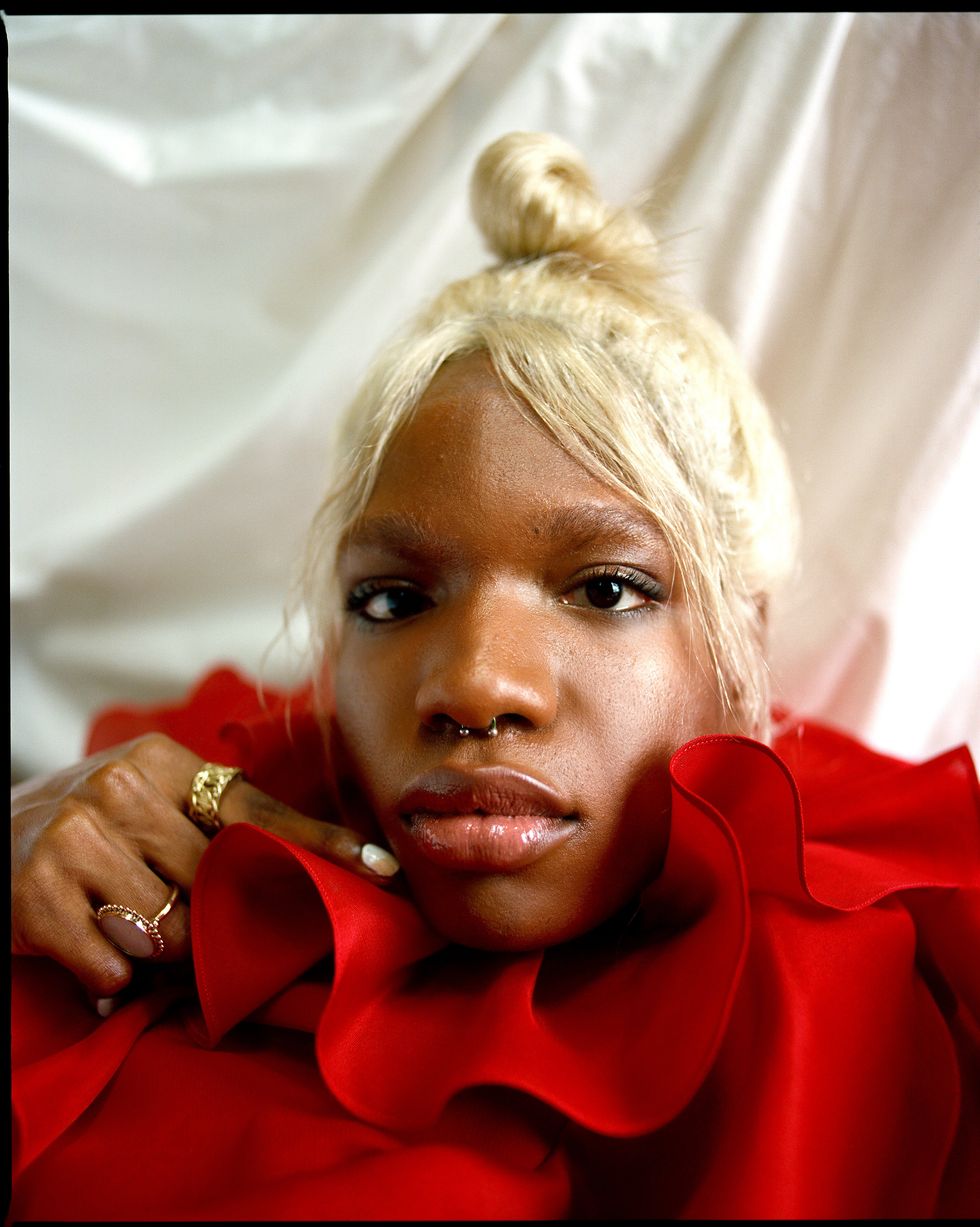
Dress: Prabal Gurung, Rings: L'Enchanteur
Naomi Campbell: How do you process and deal with any critics you may have?
Aaron Philip: I'm still improving on that majorly. Block and delete, at this point. My mom said I need to block and delete them because I feel like I often find myself putting so much energy into talking to these people when... it's not that I don't know that they're horrible, evil bigots, it's just that I feel like they are fully aware of what they're doing and what they're saying, and the rhetoric that they're spewing, and the hatefulness that they display. I want to say something to them because it makes me angry, like how can you just act like that? But for the sake of myself and for the sake of preserving me — these people are miserable. So more than anything, I just need to block and delete. Just go about my business.
Naomi Campbell: How do you spiritually prepare yourself each day? Do you have a mantra or meditation you do if things ever become overwhelming?
Aaron Philip: Now that you say that, I don't take the time to do those things. My life, even before modeling, has always been so... I've always had to be so present. Because being disabled, I have to be present of people taking care of my needs. I'm just hyper-aware of everything around me. More than anything, I just jump into these things when I do them and not think twice, and I have fun, but I think it would be good to step back and prepare myself for the experiences I'm having. Even though I'm good with jumping into it because that's what I've been doing my whole life, but some of these things are so major and beyond me. And sometimes I do take the time to meditate on them and think about them, because I write about them in my journal, and I take the time to process it, but it honestly depends. It varies.
Naomi Campbell: How does your family feel about your career?
Aaron Philip: They are so happy and so proud, which is so amazing. That's what makes it worthwhile, seeing my family being proud of me. Because I know how much sacrifices they made for me as immigrants and as hardworking mothers and fathers, to make my life what it is and come here to bring a fresh start for me. So, more than anything, making them proud is good. And I guess I make them proud by being myself, which is even the best part possible.
Naomi Campbell: What do you hope to accomplish in your career and in your lifetime?
Aaron Philip: I feel like I've accomplished so much now and I'm so grateful for every opportunity I'm offered, being that I was once not signed. And when I started out in high fashion, not a lot was going on because I was still underage, I was still 17, which was not terrible but clients were dodgy about taking me on. I want to be able to do my job and exist as who I am, the way anyone else successful has, and make a legacy by being myself, doing my job well, and working my hardest. That's what I want for myself. But ultimately, I want to be a professional runway model. The work I'm doing currently is so essential because now I'm actually approaching brands and people of all types and saying that it's possible to put me on a runway and have it be profitable and cool.
I guess there's this inner thought to the industry that taking on people like myself who are disabled or in wheelchairs is so taboo, and almost dangerous, because they don't know what to expect by putting someone on the runway like me. So I think that as much as I talk about it, it's starting to reach the right ears. And I think people are paying attention and seeing what can be done if things like simple accommodations are met for people with disabilities, like ramps and elevators on these venues. But also just making sure that you have these conversations in a corporate level so that within your companies, you say, "This is worth the investment-making." Because it's no different from any other models. I want to see them erase that narrative where it's like, "People with disabilities are so different to the point where they can't do anything that an able-bodied person can." That's so untrue as long as accommodations are met. It's executing a vision.
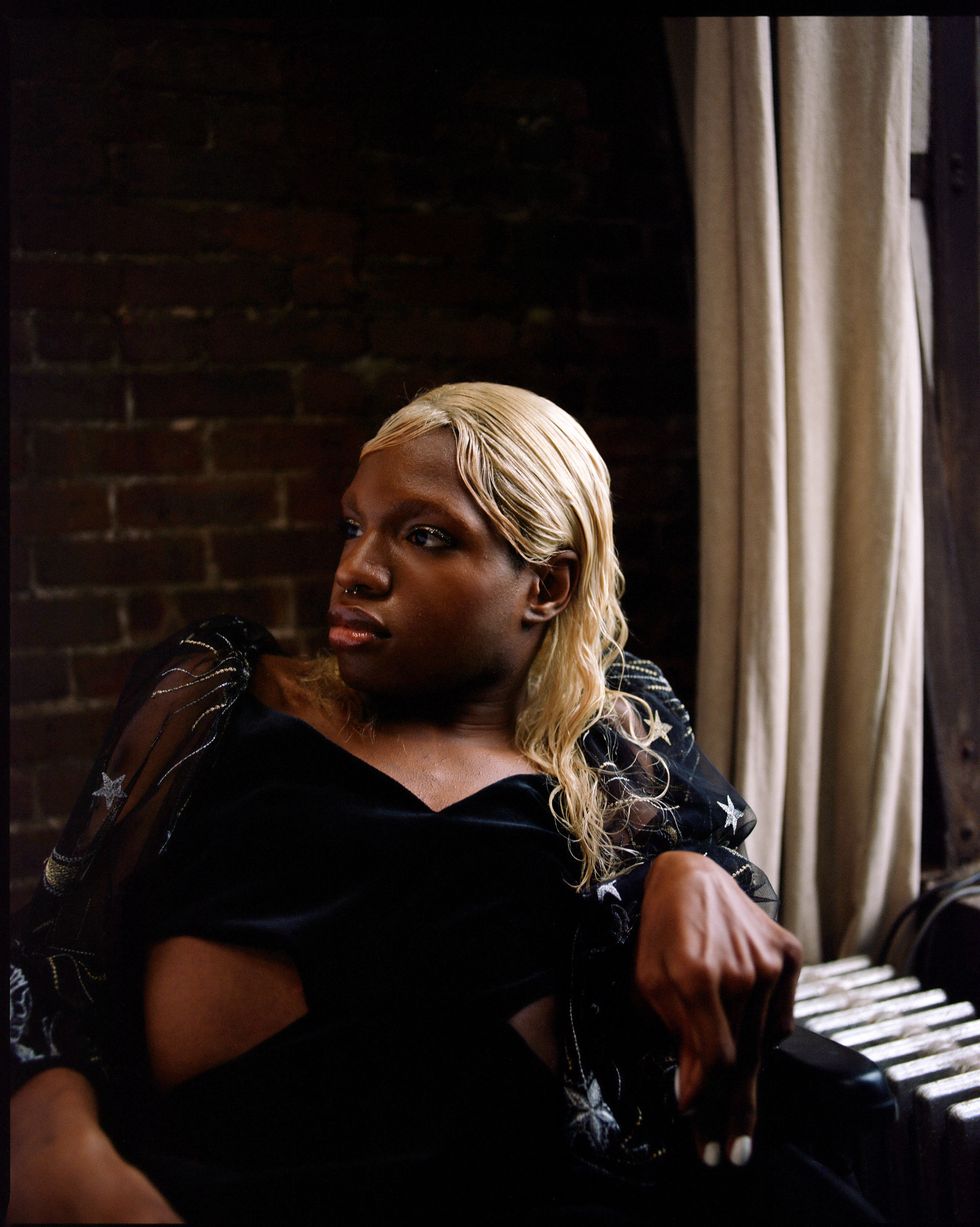
Dress: Kalmanovich
Naomi Campbell: Do you know how many people you have helped by being your authentic and honest self?
Aaron Philip: I really don't. I think that's such an interesting question. I feel like I'm doing nothing, but trying my hardest to authentically live my life and exist as who I know I am. And there are so many false narratives and interpretations about me. When you search me up on Google, you'll see: "Aaron Philip: the trans, disabled model" over and over and over again. And you'll see old pictures of me, two years back, where I didn't look anything like I look like now as an 18-year-old model who is now signed. And people still hold on to that image of me being younger. I feel like I wasn't able to be as much as myself when I was younger as I am now. I wasn't comfortable enough, I didn't have the resources. So I want nothing more but to live my life authentically and to be seen professionally and personally as literally a Black girl in a wheelchair from the Bronx, and a teenage girl who is turning into a woman or whatever that is. I want to be seen equal. I want to have the equal opportunities that any other woman would have in life itself. I want to have those experiences. I want to have normalcy.
Naomi Campbell: What's the best piece of advice you've ever gotten? The worst?
Aaron Philip: Be loud and don't look back, because the world has done so much to try and silence people like myself. It's just the truth of knowing that I want nothing more for myself than to be normal and to be seen as normal because I know that I am normal, no matter what my intersections are. I'm just a teenage girl. So if I have to be loud about pursuing and demanding normalcy from people just because I happen to be a little different, then that's what it's all about.
The worst piece of advice was to just not do anything. Because I feel like people are so scared of seeing me in pain or people saying bad things about me because I am who I am, but how can you know until you try? All of that negativity and all of that hatred is invalid because I simply just am. I know what my goals are, I know what my intentions are and I want nothing more than to be loved and valued, and profitable, and successful as myself.
Naomi Campbell: What advice would you give to young people who, like you, are trying to break the mold in some way?
Aaron Philip: Keep going. No matter what obstacles may be in your way. Just keep going and keep doing what you can to get a sense of knowledge about it. And just pursue it fully, and don't let anything stop your way, and just do what you must. Your dreams are your most important thing, and don't let go of them.
Naomi Campbell: Where does your overall determination come from?
Aaron Philip: This is a dog-eat-dog world. You gotta do what you gotta do. If it means being determined and focused, you gotta do what you gotta do. You just have to keep pushing and leave an impact. Leave something, because we all die someday.
Naomi Campbell: Why does representation matter?
Aaron Philip: Representation matters because everyone deserves to be objectively beautiful and be objectively desired. Everyone deserves to be acknowledged, respected, and valued, and seen as beautiful and desirable and alive for exactly who they are and what they love. Because people deserve to be themselves.
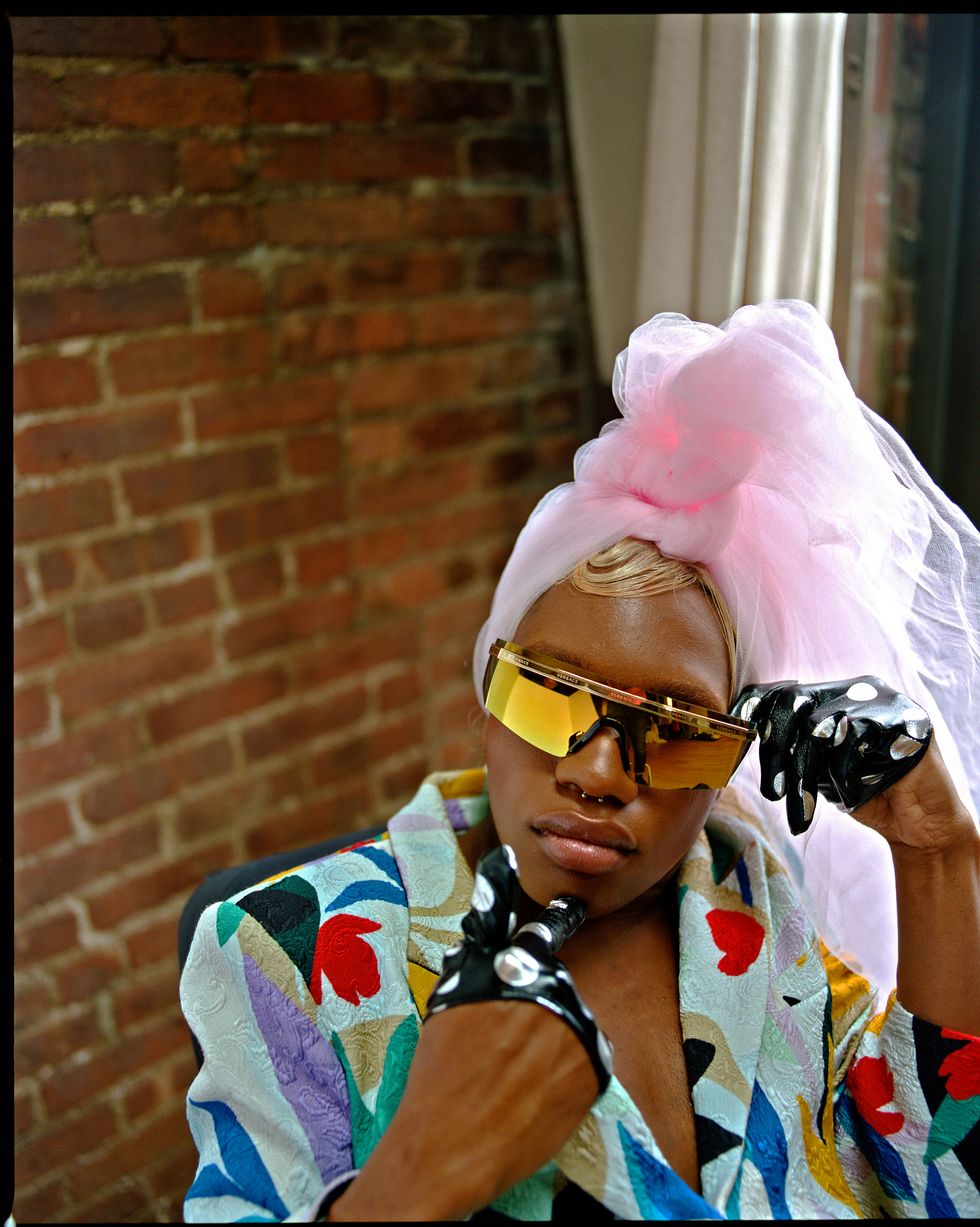
Jacket: Prabal Gurung, Sunglasses: Versace, Gloves: Wing & Weft

Aaron Philip: What was modeling like for you being my age?
Naomi Campbell: Modeling for me was thrilling, I was exploring and traveling the world. I felt like a kid in a candy store. I was very comfortable traveling and exploring new countries and territories and meeting new people and photographers. It was a whole new world for me, but I had no fear about it — it was a big adventure.
Aaron Philip: Who are people in the modeling industry that you love the most and why?
Naomi Campbell: I love the people that were there for me from the beginning, people like Beth Boldt (who discovered me), Bethann Hardison, Steven Meisel, Eileen Ford, Christy Turlington, Linda Evangelista, Stephanie Seymour, François Nars, Oribe, Azzedine Alaïa, Marc Jacobs, and so many more. The people I grew up with and that gave me opportunity. What is wonderful is that I have gotten to maintain these friendships, with those that are still here, until this day. I call them my chosen family.
Aaron Philip: What makes you feel empowered?
Naomi Campbell: Doing things and sharing things with people that I love, that they enjoy too. It can be something very simple, but just enjoying what I do with the people that I love is very empowering.
Aaron Philip: As a woman in the world, how do you take care of yourself? Do you have words of advice for young women like myself?
Naomi Campbell: I take care of myself by listening to my body. I listen to my body more than I listen to anything else. If someone says for me to slow down, but my body says it's ok, I'll keep going!
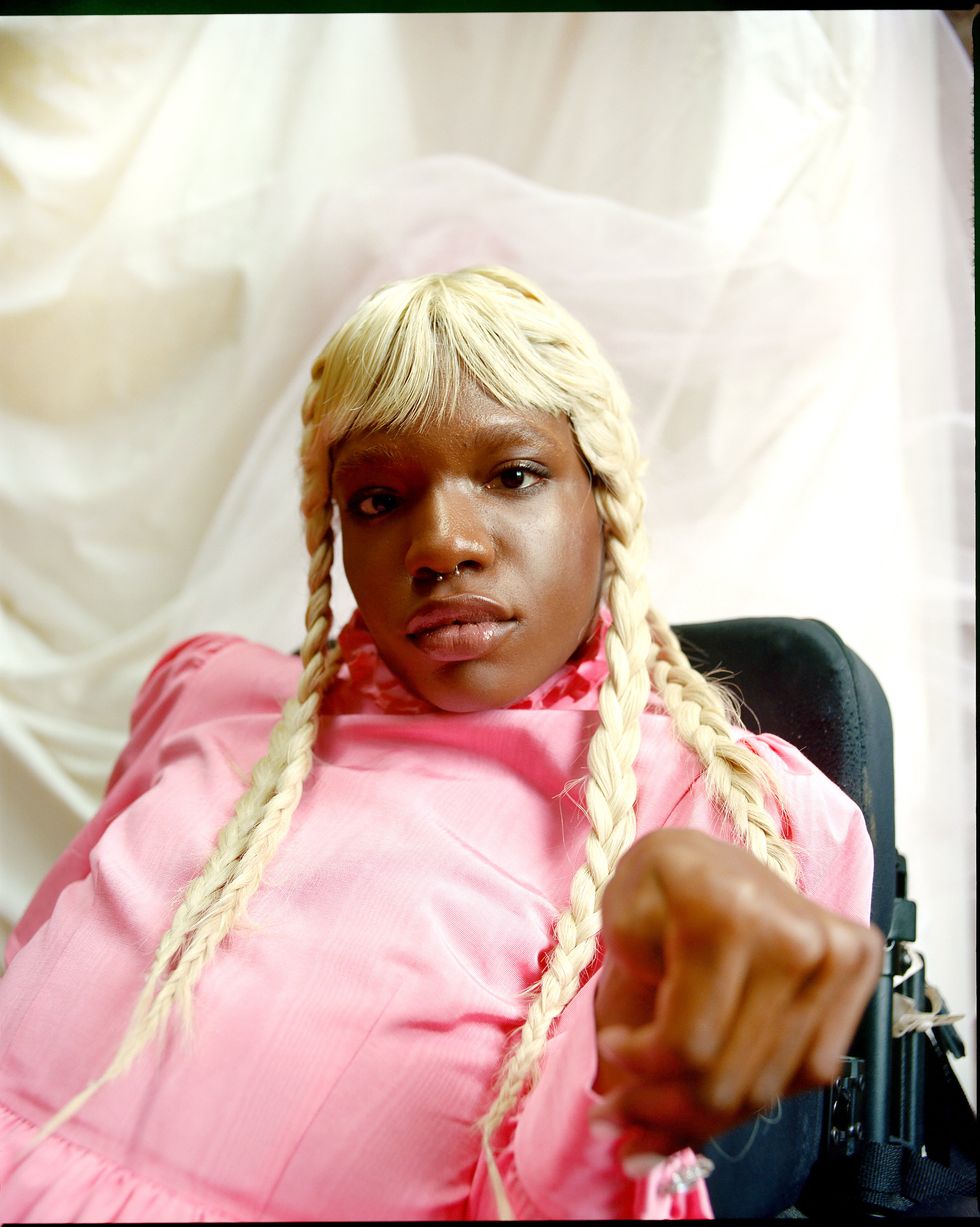
Dress: THE Marc Jacobs
Aaron Philip: What is your ideal go to outfit?
Naomi Campbell: I don't have one [Laughs]. I have a uniform when I travel, which is leggings, a big oversized top, sneakers and always a pretty coat.
Aaron Philip: What is your favorite thing about being Black?
Naomi Campbell: I am Black and I am proud. Whatever situations or obstacles that I have gone through in my career, I've embraced. I embrace the challenges. I am proud of the color of my skin and I wouldn't want to be any other way. The challenges have made me stronger — and made me understand that I have to share my story with the world to help the next generation after me, to make it easier for them.
Aaron Philip: Do you think that the fashion industry is becoming more diverse?
Naomi Campbell: It has gotten a lot better, but I still think there is a lot of improvement needed. I would now like to see the diverse models get the same contracts as their counterparts.
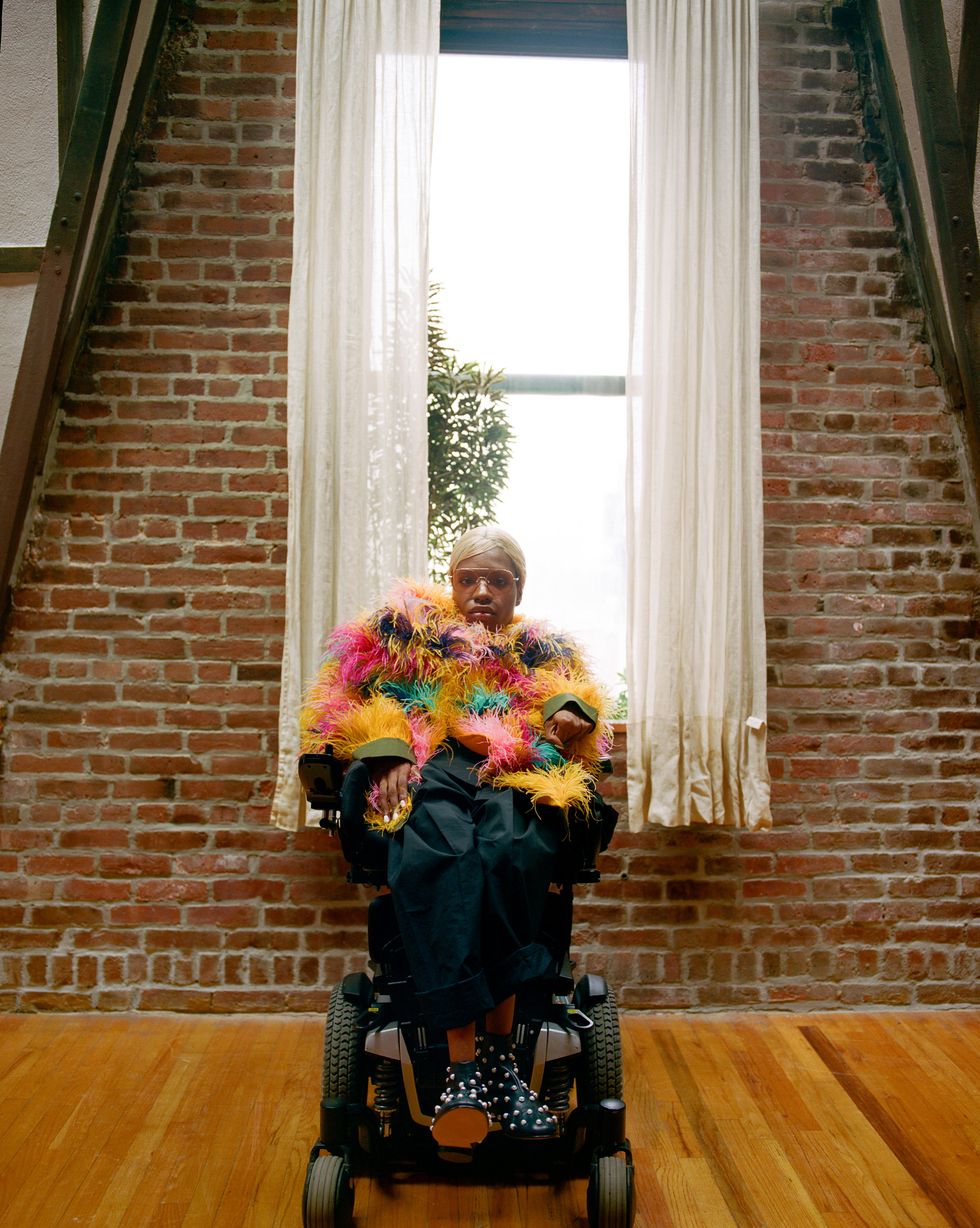
Jacket: Prabal Gurung, Sunglasses: Gentle Monster
Photography: Myles Loftin
Styling: Tiffani M. Williams
Hair: Evanie Frausto
Makeup: Raisa Flowers
Nails: Yuko Wada